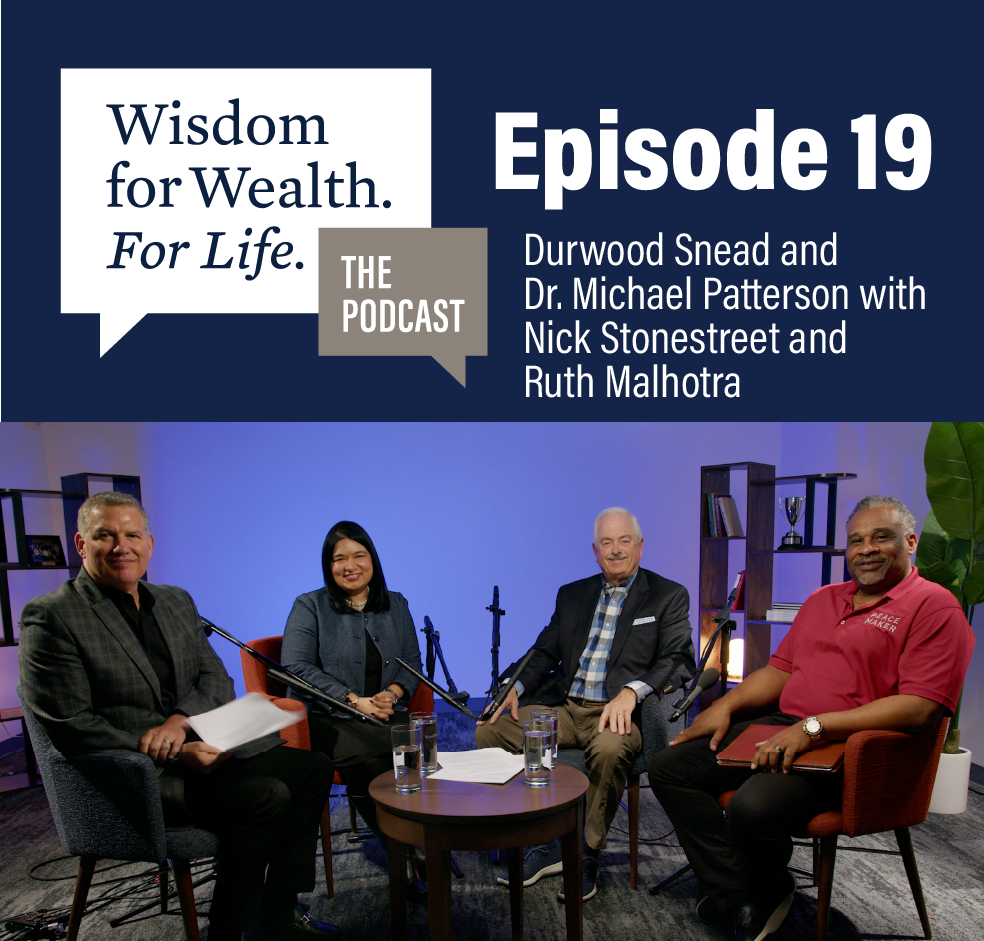“Wisdom for Wealth. For Life.” Episode 19: Black History Month: The Tragedy and Reconciliation of Forsyth County
During Black History Month, Blue Trust’s CEO, Nick Stonestreet, and manager of strategic partnerships, Ruth Malhotra, had the opportunity to have a conversation with Dr. Michael Patterson, founder of Be A Peace Maker, and Durwood Snead, a retired pastor and co-founder of the African American Descendants of Forsyth Scholarship.
After Snead moved to Forsyth County, Georgia 33 years ago, he began hearing talk of past racial oppression that made him wonder if the area would be the right community for his family. While he and his wife did stay in Forsyth County and raise five children there, it wasn’t until recent years that he fully learned about the county’s difficult history with race relations.
How Forsyth County became a flashpoint
Located about 30 miles north of Atlanta, Forsyth County is today known as a thriving, multicultural community. In fact, it has been recognized as the 13th wealthiest and seventh-fastest growing county nationwide by Forbes magazine, and boasts more than 8,000 businesses in the area.
But the community today is quite different from its past. After a series of tragic and violent events that occurred in the early 20th century, the white population pushed for what has been called a ‘racial cleansing’ that persisted for many years. In fact, Forsyth County was so unwelcoming to people of color that Oprah Winfrey brought her show to the area in 1987 to ask white residents why they still believed that Black citizens shouldn’t be allowed to live there.
The tragic back story is one of racial prejudice, probable mistaken identity, and rogue violence under the guise of justice. In September 1912, an 18-year-old white girl named Mae Crow was assaulted and died of her injuries days later. Rob Edwards, a Black man who was a newcomer to the community, was quickly arrested for the crime and placed in the local jail. A mob of white residents broke into the jail, beat and shot Edwards, and strung his body on a telephone pole in the town square, where people shot at the body during the night. Soon after, four other Black neighbors were arrested, and of the group, Ernest Knox and Oscar Daniel were convicted of the crime. They were publicly hanged.
Historians and authors have noted that Edwards never received a legal trial, and Knox and Daniel received hasty one-day trials that both happened on the same day. It’s also notable that hanging was illegal as a punishment. All three men were killed before any fair investigation into the crime could occur.
Decades of racial expulsion and exclusion
Following these events, African American churches and homes were threatened with violence if Black residents did not immediately leave the county. Nightriders went to every Black home with the threat, “If you don’t leave immediately, we will kill you. And we will burn your house down.” They went to businesses that employed Black people, most of whom were white farmers, and told them, “If you don’t get rid of these Black people on your land, we will burn your house down.” Over a period of about 30 days, virtually every Black person in the county at that time (an estimated 1,100), had to leave. Many fled overnight with whatever possessions they could carry, never to return to their homes. Processions of Black citizens were seen crossing the bridge over the Chattahoochee River to neighboring counties, where they would seek a new life.
Snead says that when he and his wife read about these actions, they wept. With the burden of their new learnings and knowledge about the past, they wanted to do something tangible that would acknowledge the pain and harm that had been done to generations of Black families.
Hope for future generations
Snead, along with other local Christians, began having discussions with African American leaders, community leaders, and descendants of those expelled from the county. After a lot of brainstorming and prayer, the idea of a scholarship for descendants was formed.
Snead wants it to be known that the scholarship is not meant to be a repayment, a reckoning, or reparations, but it is simply an act of love that will be helpful to some descendants whose families have suffered. It is not enough, but it is a step.
In August 2022, nine recipients received four-year scholarships of up to $10,000. Descendants who applied for the scholarship between February and April last year provided proof of their ancestry along with an essay detailing their family’s connection to the county and the ancestor’s journey.
“One of the things we can all learn from is the art of asking questions. Over time that learning can help move us to a position of trust, and then get to a point where we can talk about really tough stuff. ”
– Durwood Snead
While studying painful chapters of the past can be uncomfortable, it affords an opportunity to acknowledge the pain caused by wrongdoing, as well as work toward a better future and reconciliation. Even though the past cannot be erased, we can learn from it and try our best to make things right.
During Black History Month, we encourage you to consider ways to leverage your own influence for reconciliation in your community. To find out more about the work that Snead and his colleagues are doing and how you can help, visit the African American Descendants of Forsyth Scholarship.
In our “Wisdom for Wealth. For Life.” podcast series, we share financial advice and wisdom from our network of wealth advisors and thought leaders in the industry, and from around our community of over 9,500 financially blessed families who apply biblical wisdom to their financial planning and giving.
The podcast is available across most major podcast networks. If you enjoy this episode, please consider rating the podcast and sharing with friends and family wherever you listen to podcasts:
Thank you and we hope you will enjoy this exclusive content!

